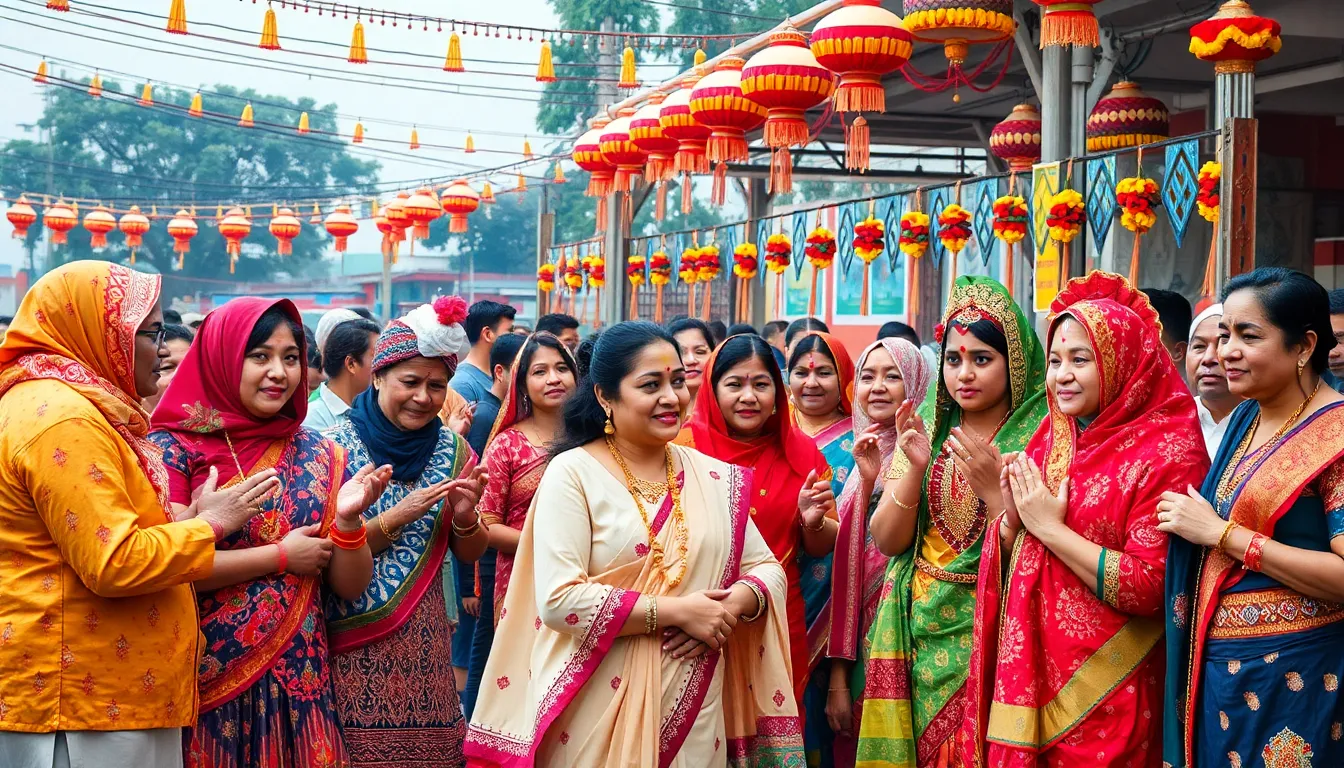Table of Contents
ToggleCultural norms shape the way people live, interact, and even think. From the way they greet each other to the foods they cherish, these unwritten rules create a vibrant tapestry of human experience. Imagine walking into a room where everyone’s bowing while you’re ready to shake hands—awkward, right? Understanding these norms can save you from social faux pas and give you a passport to deeper connections across the globe.
Understanding Cultural Norms Across Societies
Cultural norms encompass the shared expectations and rules that guide behavior within a society. These norms shape social conduct, influencing interactions and societal structure. For instance, greeting customs differ significantly from one culture to another. In many Western societies, a firm handshake is common, while in Japan, a respectful bow is preferred.
Norms also play a crucial role in food practices, impacting dietary preferences and eating habits. In India, vegetarianism is prevalent due to religious beliefs, whereas Brazil is known for its barbecuing traditions. Understanding these preferences remains essential for respectful engagement during social gatherings.
Communication styles reveal further diversity among cultures. Direct communication often characterizes Western societies, whereas indirect approaches may be more appropriate in Asian cultures. Such differences can lead to misunderstandings if individuals are unaware of the contrasting norms.
Hierarchy and authority influence cultural norms, particularly in organizational settings. In many Asian cultures, respect for authority is paramount, shaping workplace dynamics. Meanwhile, a more egalitarian approach in Nordic countries encourages open dialogue among staff, regardless of rank.
Cultural norms also affect perceptions of time and punctuality. In Germany, punctuality reflects professionalism, while in countries like Mexico, a more relaxed approach to time may prevail. Acknowledging these differences contributes to smoother interactions across cultural boundaries.
Studying these cultural norms fosters empathy and global understanding. Awareness leads to improved communication, minimizes conflict, and enhances collaborative efforts in multicultural environments. Engaging with diverse perspectives enriches personal experiences and promotes social harmony.
The Importance of Cultural Norms

Cultural norms hold significant value in shaping societal structures and interpersonal relationships. They foster social cohesion and contribute to individual and collective identities.
Social Cohesion and Identity
Cultural norms strengthen connections among community members. They provide a sense of belonging, allowing individuals to identify with their cultural groups. Rituals and traditions create shared experiences that reinforce these bonds. For instance, communal festivals in India reflect common cultural heritage. Various groups celebrate their customs, promoting unity and understanding. Cultural storytelling also enhances identity, as narratives passed through generations shape perspectives. Understanding cultural norms facilitates smoother interactions and builds trust within diverse environments. These shared practices enable individuals to align their actions and behaviors according to established guidelines, enhancing social harmony and stability.
Guiding Behavior and Expectations
Cultural norms establish frameworks for acceptable behavior across different societies. They set clear expectations for interactions, influencing how individuals communicate and relate to one another. For example, eye contact signifies confidence in many Western cultures but may be considered disrespectful in some Asian cultures. Norms guide everyday decisions, from dining etiquette to workplace interactions, reflecting values and priorities. In many cultures, there exists an unspoken understanding of roles, influencing authority dynamics and relationships. Effective navigation of these norms leads to positive social engagements and reduces the likelihood of misunderstandings. Recognizing divergent cultural expectations encourages respectful dialogue and open-mindedness, essential skills in an increasingly interconnected world.
Variations in Cultural Norms
Cultural norms differ significantly across societies, reflecting diverse values and social structures.
Individualistic vs. Collectivist Cultures
Individualistic cultures prioritize personal autonomy and self-expression. People in these societies often value personal achievements and independent decision-making. For example, in the United States, self-reliance is highly regarded, influencing how individuals pursue goals. Collectivist cultures, on the other hand, emphasize group harmony and community well-being. In such societies, personal actions usually consider their impact on family and community, exemplified by practices in countries like China. Each framework shapes social interactions and individual identities, defining how members engage with one another and navigate societal expectations.
Traditional vs. Modern Societies
Traditional societies often uphold long-standing customs and practices. These cultures frequently place importance on family lineage, rituals, and preserving historical values. For instance, many African communities retain age-old practices that dictate social behavior. In contrast, modern societies embrace change and innovation. Rapid technological advancement influences their way of life, promoting individual freedom and diverse lifestyles. In urban centers like New York, cultural expressions constantly evolve. Each societal type presents unique norms that guide behavior, reflecting deeper values inherent in human interactions.
Case Studies of Cultural Norms
Cultural norms vary significantly across different societies, influencing behavior and social interactions. Examining specific cultural contexts reveals unique traits and practices.
Asian Cultural Norms
Asian cultural norms often prioritize collectivism and harmony. In many Asian societies, maintaining group cohesion ranks above individual expression. For example, family involvement in decision-making reflects the importance of interpersonal relationships. Indirect communication is favored, which helps avoid confrontation and preserves face. Additionally, respect for elders shapes social hierarchies, guiding interactions and expectations. Rituals, such as family reunions during holidays, strengthen communal bonds while reinforcing cultural identity. Emphasis on education and achievement also marks these societies, driving individuals to excel within shared values. Understanding these characteristics fosters empathy and smooth interactions in multicultural settings.
Western Cultural Norms
Western cultural norms typically emphasize individualism and self-expression. Personal autonomy drives decision-making, with individuals often expressing their thoughts openly. The direct communication style common in Western societies encourages clarity and transparency in conversations. Equality and egalitarianism play vital roles, particularly in workplace dynamics, where hierarchy often appears less rigid. Friendships may develop quickly due to a more casual relationship approach. Celebrations of personal milestones, such as birthdays and graduations, prioritize individual achievements. Understanding these distinct traits enhances cross-cultural communication, leading to more meaningful interactions across societies.
The Impact of Globalization on Cultural Norms
Globalization significantly shapes cultural norms across societies, influencing behaviors and interactions. It enhances exposure to diverse practices, which often leads to the blending of traditions. Cultural exchange may result in adapting customs, such as the increasing popularity of sushi outside Japan or yoga’s rise in the Western world.
In a globalized context, individuals may experience a mix of local and foreign influences that redefine social expectations. The spread of Western values prevalent in many media outlets alters perceptions of individualism. Many societies begin to value self-expression, impacting traditional collectivist frameworks.
Communication styles also shift due to globalization. Direct communication, often characteristic of Western cultures, gains traction in other regions, leading to increased clarity in interactions. Younger generations in Asia adopt these styles, fostering a hybrid approach that incorporates both indirect and direct methods.
Hierarchical structures face challenges as egalitarian principles permeate cultures. Many workplaces integrate flatter organizational models, allowing for more democratic decision-making processes. This shift enhances teamwork and collaboration.
Furthermore, globalization influences perceptions of time and punctuality. Citizens of nations like Brazil, where time is often flexible, encounter individuals from strict punctuality cultures, such as Germany. As the world connects, these attitudes may merge, creating a dynamic understanding of time management.
Cultural norms adapt more rapidly now, balancing the preservation of heritage with the embrace of change. The blending of traditions generates new rituals that reflect contemporary values. Through this transformation, societies cultivate enriched interactions and deeper connections, highlighting the importance of understanding varying cultural expectations.
Cultural norms play a pivotal role in shaping interactions and fostering connections across diverse societies. By understanding these unwritten rules, individuals can navigate social landscapes more effectively and engage with others in a meaningful way.
As globalization continues to influence cultural practices, the blending of traditions offers opportunities for richer exchanges and deeper relationships. Embracing the nuances of cultural norms not only enhances personal experiences but also promotes empathy and collaboration in an increasingly interconnected world.
Ultimately, recognizing and respecting these differences paves the way for improved communication and social harmony among individuals from varied backgrounds.








